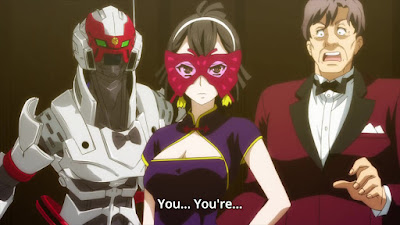While I consider myself a somewhat knowledgeable, well-rounded anime
fan, I'm pretty ignorant when it comes to sports anime. This is
normal; sports shows don't tend to get released very often in
America, and have a history of selling poorly when they do.
Nevertheless, it's a hole I've been meaning to fill, so at my
sister's urging (much better-versed in the genre than myself) I
picked up two shows over the last year or so: cycling anime
Yowamushi Pedal and volleyball anime Haikyuu!!.
Haikyuu!! I recently finished the first season of, and enjoyed
a lot. Yowamushi Pedal I petered out on a long time ago.
The biggest reason for my disinterest would be Yowamushi Pedal's
glacial pacing. Over the twenty episodes I watched, the main
characters never take part in an official competition. Okay,
so there is actually a lot of racing; the characters usually spice up
their training with plenty of informal competitions to keep things
fresh. An early episode where the hero, Onoda, and his friend are
determined to catch up to a littering driver is great. And we
glimpse the end of a qualifying race that some upperclassmen take
part in. But despite how they spice things up, the fact remains that
we spend seven episodes on a training camp that only matters because
everyone keeps insisting that it matters.
In contrast, Haikyuu!! keeps things moving briskly along.
Over twenty-five episodes, three official games are played start to
finish, as well as two practice games, training camp, and bits and
pieces of games played by other teams are touched on. That pace is
just easier for me to go along with, especially after I found out
that Season One of Yowamushi Pedal ended on a cliffhanger, and
Season 2 spends almost its entirety on a. Single.
Race. Tell me that doesn't sound like a punishing watch.
Maybe they should have added a few exclamation points in their title
to speed up the pace . . .
But length is meaningless if the characters are lovable, right?
Well, here again I found Haikyuu!! the stronger of the two
shows. Not for its lead characters; naïve, enthusiastic Onoda and
cold, haughty Imaizumi are almost carbon copies of --- and --- from
Yowamushi Pedal. It's the team that sticks in the memory.
Everyone has their own strengths and weaknesses, but is basically a
good, well-rounded person in their own way, maybe even with goals and
interests that extend outside the volleyball court. The
upperclassmen are helpful and supportive, never holding themselves
above their juniors, in one case sacrificing their own time on the
court for the greater good. This kind of teamwork doesn't happen as
often in Yowamushi Pedal; the seniors; idea of support is
“make the underclassmen bike one thousand kilometers after we let
some air out of their tires.” Tough love, indeed. We
unfortunately don't even have any rival bikers to shake things up
because, you know, there haven't been any actual races yet at this
point. These are problems I hear got fixed later, but of course I
didn't stick around to see this. When so many basic elements haven't
fallen into place twenty episodes in, Yowamushi Pedal kinda
fails at being a compelling sports drama.
That's not to say it does everything wrong, though. The animation
and music are both top-rate all the way through. Better yet, the
show goes into the basic tactics of cycling enough for a novice like
me to respect it as a serious sport. And it's not like I actively
hate all the characters; they're fine, except for some upperclassmen.
Like the guy with the constant rapeface.
No, not that one.
Gah! Okay, he has one too, but I didn't even get to his character
introduction before dropping the show!
Yeah, he's who I was thinking of. Look at those hungry eyes.
But the way I see it, Yowamushi Pedal doesn't do well at two
vital components of sports anime. I'm not invested in the races
because there aren't any, and I'm not invested in the characters
because there aren't enough truly sympathetic or engaging ones. It
focuses too narrowly on the sport itself, while Haikyu!! is
more about the drama. Characters grow and change on and off the
court, and a steady barrage of new situations (read: actual games)
keeps that growth constant; it's just more compelling than watching
--- learn a new stamina-saving technique that's . . . nice, I guess,
but doesn't affect the team dynamic or his psychological growth in
any meaningful way.
If you love Yowamushi Pedal, awesome. I can't call it an
outright bad show by any stretch. But this is one sports ignoramus
who thinks Haikyu!! beats it on every level. Now, can anyone
offer advice on how to get this face out of my nightmares?









































